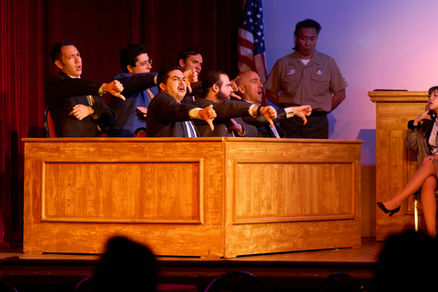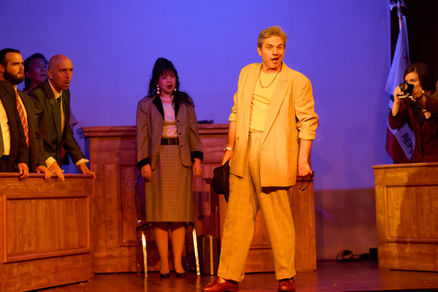





by Derrick Wang
by Gilbert & Sullivan
Highland Park Ebell Club
131 S Ave 57
Los Angeles, CA 90042
WEEKEND 1
Friday November 17, 2023 | 7:00pm
Saturday November 18, 2023 | 7:00pm
Sunday November 19, 2023 | 3:00pm
WEEKEND 2
Friday November 24, 2023 | 7:00pm
Saturday November 25, 2023 | 7:00pm
Sunday November 26, 2023 | 3:00pm
Presenting the LA premiere of Derrick Wang's Scalia/Ginsburg! Hailed as “a dream come true” (Ruth Bader Ginsburg), a “perfect…jewel” (Opera Today), and “the kind of opera that should be everywhere” (OperaWire), Scalia/Ginsburg is a one-act operatic comedy about the unlikely friendship between U.S. Supreme Court Justices Ruth Bader Ginsburg and Antonin Scalia — and the pivotal moment that would change the Supreme Court for years to come. This juristic double bill will also feature Gilbert & Sullivan’s one act gem, Trial by Jury. Artistic Director Josh Shaw’s and Kelsey N. Johnson's new libretto updates the setting from 1880s England to a 1980s divorce court.
.jpeg)
WHO NEEDS TURKEY
when you’ve got wine and cheese? POP’s double bill is the perfect “outside the box” outing for your Thanksgiving! Whether it's a hilarious night out for the whole family or you’re simply stuck in LA for the holidays, let POP be a part of your Thanksgiving table.
General seating starts from just $15. Table seating starts at $40/person. All tables come with a charcuterie platter and a bottle of wine!
SCALIA/GINSBURG GLOSSARY
Terms (legal and otherwise) that you may not know: - Argle-bargle – an argument or dispute - Certiorari - a writ of superior court to call up the records of an inferior court or a body acting in a quasi-judicial capacity - Constructive Speech - The first speeches in a debate, where the debaters “construct” their cases by presenting initial positions and arguments. - Dissent - a justice's nonconcurrence with a decision of the majority - Extirpation - to destroy completely - E.R.A (Equal Rights Amendment) - a proposed amendment to the United States Constitution designed to guarantee equal legal rights for all American citizens regardless of sex. It seeks to end the legal distinctions between men and women in terms of divorce, property, employment, and other matters. The ERA was first drafted in 1923. It was approved by Congress in 1972 and sent to the states for ratification. By 1977, only 35 states had ratified the ERA. The ERA was never ratified as an amendment. Flexible – another word for liberal (according to some) Invective - an abusive expression or speech - Putsch - a secretly plotted and suddenly executed attempt to overthrow a government - W.R.P (Women’s Rights Project) - co-founded in 1972 by RBG, The WRP empowers poor women, women of color and immigrant women who have been victimized by gender bias and face pervasive barriers to equality, through litigation, community outreach, advocacy and public education. Supreme Court Cases Referenced: Bush v. Gore (2000) Following the U.S. Supreme Court's decision in Bush v. Palm Beach County Canvassing Board, and concurrent with Vice President Al Gore's contest of the certification of Florida presidential election results, on December 8, 2000 the Florida Supreme Court ordered that the Circuit Court in Leon County tabulate by hand 9000 contested ballots from Miami-Dade County. It also ordered that every county in Florida must immediately begin manually recounting all "under-votes" (ballots which did not indicate a vote for president) because there were enough contested ballots to place the outcome of the election in doubt. Governor George Bush and his running mate, Richard Cheney, filed a request for review in the U.S. Supreme Court and sought an emergency petition for a stay of the Florida Supreme Court's decision. The U.S. Supreme Court granted review and issued the stay on December 9. It heard oral argument two days later. Craig v. Boren, 429 U.S. 190 (1976) Appellant Craig, a male then between 18 and 21 years old, and appellant Whitener, a licensed vendor of 3.2% beer, brought this action for declaratory and injunctive relief, claiming that an Oklahoma statutory scheme prohibiting the sale of "nonintoxicating" 3.2% beer to males under the age of 21 and to females under the age of 18 constituted a gender-based discrimination that denied to males 18-20 years of age the equal protection of the laws. Recognizing that Reed v. Reed, and later cases establish that classification by gender must substantially further important governmental objectives, a three-judge District Court held that appellees' statistical evidence regarding young males' drunk-driving arrests and traffic injuries demonstrated that the gender-based discrimination was substantially related to the achievement of traffic safety on Oklahoma roads. Duren v. Missouri (1979) A jury convicted Billy Duren of first degree murder and first degree robbery. Duren alleged that the selection of this jury violated his Sixth and Fourteenth Amendment right to a trial by a jury chosen from a fair cross section of the community. Specifically, Jackson County allowed an automatic exemption from jury service for women upon request. While women made up 54% of the population in the Jackson County, only 26.7% of people summoned from the jury wheel were women. Defendant had an all-male jury selected from a panel of 48 men and 5 women. The Missouri Supreme Court affirmed the conviction, questioning the validity of Duren’s statistics. The court also held that even if women were disproportionally excluded from jury service, the amount of women who participated in the process was well above constitutional standards. Moritz v. Commissioner of Internal Revenue (1972) A case in which the Court held that discrimination on the basis of sex constitutes a violation of the Equal Protection Clause of the Constitution. Charles Moritz had claimed a tax deduction for the cost of a caregiver for his invalid mother and the Internal Revenue Service had denied the deduction. The law specifically allowed such a deduction, but only for women and formerly married men, which Moritz was not. Goesaert v. Cleary (1948) A Michigan statute required that all bartenders hold licenses in cities with populations greater than 50,000, but the statute also stated that a woman could not be issued a license unless she was "the wife or daughter of the male owner" of a liquor establishment. Two female bartenders challenged the law, requesting an injunction against its enforcement, on the ground that it violated the Equal Protection Clause of the Fourteenth Amendment. Frontiero v. Secretary of Defense (1973) Sharron Frontiero, a lieutenant in the United States Air Force, sought a dependent's allowance for her husband. Federal law provided that the wives of members of the military automatically became dependents; husbands of female members of the military, however, were not accepted as dependents unless they were dependent on their wives for over one-half of their support. Frontiero's request for dependent status for her husband was turned down. Roe v. Wade (1972) Jane Roe (a fictional name used in court documents to protect the plaintiff’s identity) filed a lawsuit against Henry Wade, the district attorney of Dallas County, Texas, where she resided, challenging a Texas law making abortion illegal except by a doctor’s orders to save a woman’s life. In her lawsuit, Roe alleged that the state laws were unconstitutionally vague and abridged her right of personal privacy, protected by the First, Fourth, Fifth, Ninth, and Fourteenth Amendments. Palmieri v. State of Florida (1968) A case concerning the admissibility at trial of 'lineup' identifications made after the petitioner was arrested without probable cause for the sole purpose of gathering evidence against him. Upon review of the record, it became evident that the legality of the petitioner's arrest was not at issue in the Florida appellate courts. Shelby County v. Holder (2013) A landmark decision by the Supreme Court regarding the constitutionality of two provisions of the Voting Rights Act of 1965, which requires certain states and local governments to obtain federal preclearance before implementing any changes to their voting laws or practices.
































